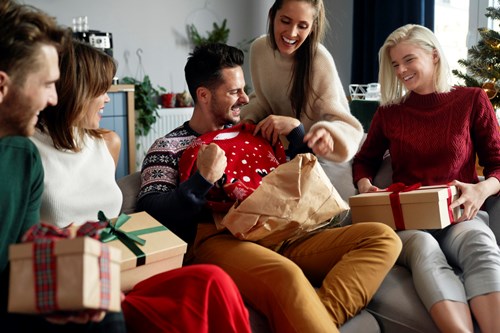Food, Hooray!
Drink, Hooray!
Presents- Aargh!
Do you have a similar reaction when faced with the task of buying – or receiving a gift at Christmas? (Or any other gift-giving or exchanging situation, but we’ll stick with the festive theme).
We can feel immense pressure at the thought of Christmas present shopping. A common feeling experienced is anxiety about the reaction of the other person – or your own reaction – when exchanging gifts.
Research indicates that this increased anxiety is related to expectations. When we give someone a gift, we are on high alert and looking out for clues that reveal whether the recipient was satisfied. Then, if we don’t get the response we were expecting (e.g., a smile, breaking down into grateful tears, or a very enthusiastic “thank you”) we might feel let down.
If we reverse that scenario, we might experience pressure as a recipient to express satisfaction, even if it’s something we don’t want!


Here are just a few ways we can reframe our experience of gift-giving that can help take this pressure of expectations off.
Don’t feel obliged to buy for everyone, could you make an arrangement with families and friends about gift exchanges rather than having to buy for each individual?
Approach gift-giving as an exercise in altruism, where the focus is on the action rather than the outcome. It helps to remove some of the pressure to perform and can make gift-giving a much more rewarding experience.
When receiving a gift, focus on the gift as a symbolic gesture that forms a connection between the giver and receiver in the moment. For example, if you and the gift giver went to have a meal and one of you didn’t like what you ordered, it doesn’t take away from the fact that the meal still brought you together.
Some families or groups adopt a “white elephant” present exchanging scheme where everyone taking part brings a gift that could be suitable for anyone, so there is no pressure with who the recipient is or what you are likely to receive.
A lot of the time, a gesture to show you care and are thinking of people can be really effective. Homemade gifts, such as biscuits, fudge, cakes, or if you’re creative, arts and crafts, meaning you can give a from-the-heart gift that doesn’t break the bank. You can even personalise them if necessary, e.g., taking into consideration dietary requirements (I am friends with a family who are dairy free, and they love receiving fudge made just for them with no dairy!).
And if you're a business owner, are you promoting the gift voucher of your business as an option? This is an excellent opportunity to get support from friends and family while supporting the local economy, especially since the hospitality sector will face another challenge after Christmas due to the increasing cost of operation. Want some inspiration? Head to the page of Give The Gift of Going Out, it's a campaign launched by Greater Manchester's Night Time Economy Adviser, that aims to help the struggling sector by encouraging the public to support their favourite restaurants, bars, hotels, theatres and live gig venues by gifting family and friends a night out for Christmas.


You could even consider making a donation to charity in place of giving gifts. Remember – it’s your choice how you spend your time and money resources.
About the author
Abby Booth
Health and Wellbeing Specialist
Abby is a qualified Behaviour Change (Health and Wellbeing) practitioner with an academic background in psychology. She has 12 years’ experience working in health and social care roles, from coaching at the NHS 111 service to working in a homelessness hostel and day centre. During this time, she worked with a range of adults from different backgrounds, focusing on improving their health and wellbeing with a person-centred approach.




